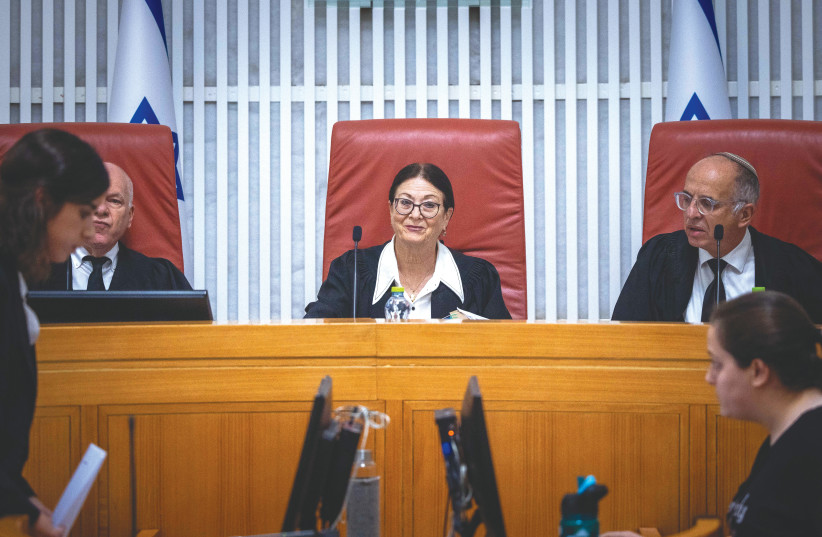A lawyer activist group is calling to shut down the courts for an hour and hold a demonstration on Thursday in front of the Tel Aviv District Court to protest Justice Minister Yariv Levin’s judicial reforms, as other legal field professionals, like the deans of many of Israel’s legal faculties, have come out against the reforms.
The Black Robes Protest group said on Monday that thousands of lawyers were expected to participate, and that similar demonstrations were expected across the country. The activist movement also promised pro bono legal assistance from the largest firms in the country to those fired because of the government’s new reforms.
“The attempts of the politicians to destroy any trace of those who think differently from them is a clear example of unlimited power,” said the group. “Among the fired are the best minds, talented people who led steps to strengthen and advance the state in all fields.”
The protest comes after a series of demonstrations since Levin introduced his judicial reform plan on Wednesday. On Friday, hundreds from the Darkenu movement rallied in front of Levin’s home saying the reforms threatened the High Court of Justice’s ability to defend soldiers from the International Criminal Court.
On Saturday, around 30,000 people marched through Tel Aviv as part of a broad coalition of activist groups, mostly from the left wing of the political spectrum. They contended that the reforms represented an attempt at a “coup d’état.”

The anti-Netanyahu Black Flag movement said protests would continue this Saturday night.
The Black Robes, ostensibly made up of private sector lawyers from major firms, has previously stated that Israel is in a time of emergency, and will work with the Israel Bar Association to challenge what they see as a threat to democracy.
Israel Bar Association President Avi Himi also took an intense line of attack against the reforms on Friday, comparing Levin’s proposals to the 2021 January 6 US Capitol riots on the anniversary of the event.
“Today we mark in the USA two years since the anti-democratic assault on the Capitol. Now we also have an attack on the Israeli ‘capitol’ – the courts,” Himi said at a Movement for Quality Government conference. “The Bar Association will continue to stand for the rights of the judicial system.”
Changes are Knesset's right but are too radical, deans say
Eight university and college law faculty deans also criticized the reforms on Sunday in a letter.
The letter, signed by deans from Bar-Ilan University, Tel Aviv University, the Hebrew University of Jerusalem, Reichman University, the University of Haifa, College of Management Academic Studies, The College of Law and Business and Sapir Academic College warned that the reforms represented a threat to the democratic and liberal nature of the state of Israel.
“With the [reforms], it appears that the new government seeks to make a radical change in the constitutional structure of Israel and its legal system,” the letter reads. The changes would alter the system of checks and balances in the country, which the legal educators said are required in a democracy.
"These changes seek to...[make] the judiciary almost completely subordinate to the coalition."
Eight Israeli university and college law faculty deans
LEVIN’S PROPOSALS touched on several items within the legal system, building on 2022 general election discussions and proposals.
What are the reform proposals?
One of the proposals would add two more politicians to the committee that selects judges. This would give elected officials a majority within the committee, which is also staffed by other judges. Supporters argue that allowing unelected judges to self-select is undemocratic.
“These changes seek to subject the appointments – and even worse, also their promotions and dismissal – of all judges in the State of Israel to the majority in the Knesset, thereby changing in one fell swoop the method of appointing judges which reflected an agreed social balance, and making the judiciary almost completely subordinate to the coalition,” the deans said of this proposal.

Levin also called to discontinue the use of the “reasonableness clause,” which allows the courts to intercede in instances in which an action is beyond the scope of what a reasonable and responsible authority would undertake. Reform proponents have argued that the clause is highly subjective, and allows for judges to insert their own opinions on policy.
In the letter, the deans argued that the reasonableness clause “is an important clause in public law that allows the court to coordinate the law with a different reality and protects the individual and the public from arbitrary administrative actions.”
The academics also argued against the introduction of an override clause, which since the election has held a central spot in public discourse, saying it would remove the High Court’s ability to engage in judicial review of Knesset legislation.
The override clause would allow for a simple majority in the Knesset, 61 members, to overturn the High Court’s striking of laws that are in contradiction with the quasi-constitutional Basic Laws.
Besides the High Court and judges, Levin said that insubordination by government legal advisers would no longer be tolerated. The deans said blacklisting civil servants would impact their independence and professionalism.
The letter noted that it was the right of the Knesset to promote policy changes, and acknowledged the call to reduce the role of legal bodies in policy-making, but said the proposed changes were radical and hasty.
The deans called for dialogue, adding that regular Knesset committee hearings would not be suitable.
This dialogue should happen “in a participatory process with all levels and parts of society, with mutual respect, knowledge-based thinking with interests aimed at strengthening relationships,” said the deans.
The educators emphasized that the positions in the letter were their own, and not that of their academic institutions.
